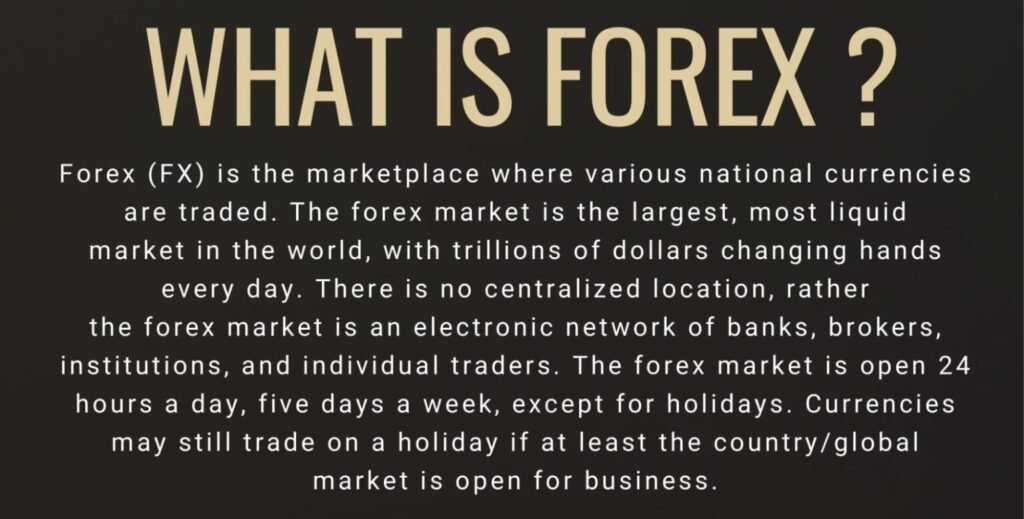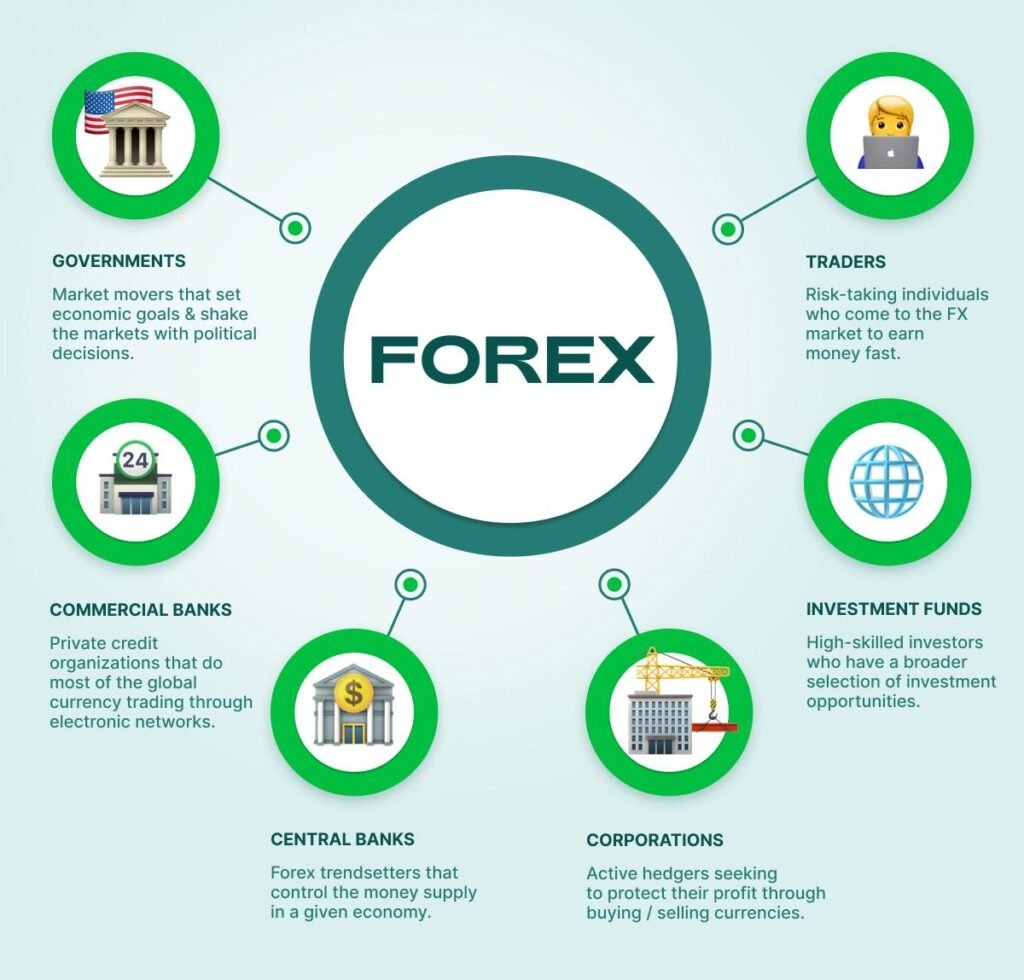What is forex?

Introduction
Forex, also known as foreign exchange, is the global decentralized market where individuals, businesses, and financial institutions trade currencies. It is the largest and most liquid market in the world, with an average daily trading volume of around $6 trillion.
Understanding Forex

Forex trading involves buying one currency and selling another at the same time. Currencies are traded in pairs, such as EUR/USD (euro/dollar) or GBP/JPY (British pound/Japanese yen). The value of a currency pair fluctuates based on various factors such as economic indicators, geopolitical events, and market sentiment.
Forex trading takes place 24 hours a day, five days a week, allowing traders to take advantage of global economic events and news. Unlike other financial markets, such as the stock market, forex trading has no centralized exchange. Instead, it operates through a global network of banks, corporations, and individuals.
Benefits of Forex Trading
1. High liquidity: Due to its massive trading volume, forex offers high liquidity, meaning traders can easily enter and exit positions at any time without significant price fluctuations.
2. Accessibility: Forex trading can be done online from anywhere in the world, making it accessible to individuals with an internet connection. Additionally, the market is open to traders of all levels, from beginners to professionals.
3. Leverage: Forex brokers offer leverage, allowing traders to control larger positions with a small amount of capital. However, leverage can amplify both profits and losses, so it should be used with caution.
Risks of Forex Trading
1. Volatility: The forex market can be highly volatile, with prices fluctuating rapidly. While volatility provides opportunities for profit, it also increases the risk of losses.
2. Leverage risks: As mentioned earlier, leverage can magnify losses. Traders should be aware of the potential risks associated with using leverage and manage their positions accordingly.
3. Market risks: Currency prices are influenced by a wide range of factors, including economic indicators, political events, and natural disasters. These external factors can impact the forex market and result in unexpected losses.
Key Participants:

The forex market is decentralized, meaning there's no central exchange. Instead, it operates electronically over-the-counter (OTC), allowing for 24-hour trading. Major participants include banks, financial institutions, corporations, governments, and individual traders.
Currency Pairs:
In forex trading, currencies are quoted in pairs, expressing the exchange rate of one currency against another. The first currency in the pair is the base currency, and the second is the quote currency. For example, in the pair EUR/USD, the euro is the base currency, and the U.S. dollar is the quote currency.
How Forex Trading Works:
Leverage and Margin:
Forex trading often involves the use of leverage, allowing traders to control a large position with a relatively small amount of capital. While this magnifies potential profits, it also increases the risk. Traders need to be cautious and use risk management strategies.
Major and Minor Pairs:
Major currency pairs involve the most traded currencies globally, such as EUR/USD and USD/JPY. Minor pairs, also known as cross-currency pairs, don't include the U.S. dollar, like EUR/GBP and AUD/JPY.
Forex Market Hours:
As the forex market operates 24 hours a day, it's divided into major sessions: the Asian, European, and North American sessions. This continuous operation allows for flexibility in trading, accommodating various time zones.
Factors Influencing Exchange Rates: Exchange rates are influenced by a myriad of factors, including economic indicators (GDP, employment data), interest rates, geopolitical events, and market sentiment. Traders analyze these factors to make informed decisions.
Ssl meaning in forex
SSL meaning in forex: SSL stands for Secure Sockets Layer, which is a protocol used to establish a secure connection between a web server and a browser. In the context of forex trading, SSL is crucial for ensuring the security of online trading platforms and protecting sensitive data, such as login credentials and financial information.
SSL encryption: SSL encryption is the process of encoding data transmitted between a web server and a browser, making it unreadable to anyone who intercepts it. This encryption ensures that sensitive information shared during online forex trading, such as account numbers and credit card details, remains private and secure.
Importance of SSL in forex: SSL plays a critical role in maintaining the integrity and trustworthiness of forex trading platforms. It provides a secure environment for traders to execute their trades and protects them against potential cyber threats, such as hacking and data breaches. SSL certificates also help establish the authenticity and identity of the forex broker, ensuring that traders are interacting with a legitimate and trustworthy entity.
Benefits of SSL in forex: The use of SSL in forex trading offers several benefits. Firstly, it instills confidence in traders, knowing that their personal and financial information is secure. Additionally, SSL encryption helps prevent unauthorized access to trading accounts, reducing the risk of identity theft and fraud. Moreover, the presence of SSL certificates on a forex broker's website enhances its credibility and professionalism, attracting more traders and fostering apositive trading environment.
conclusion
Forex trading offers opportunities for individuals and businesses to profit from the fluctuations in currency prices. It is a dynamic and accessible market that operates globally. However, it is important to understand the risks involved and develop a sound trading strategy to navigate the forex market successfully.

Leave a Reply